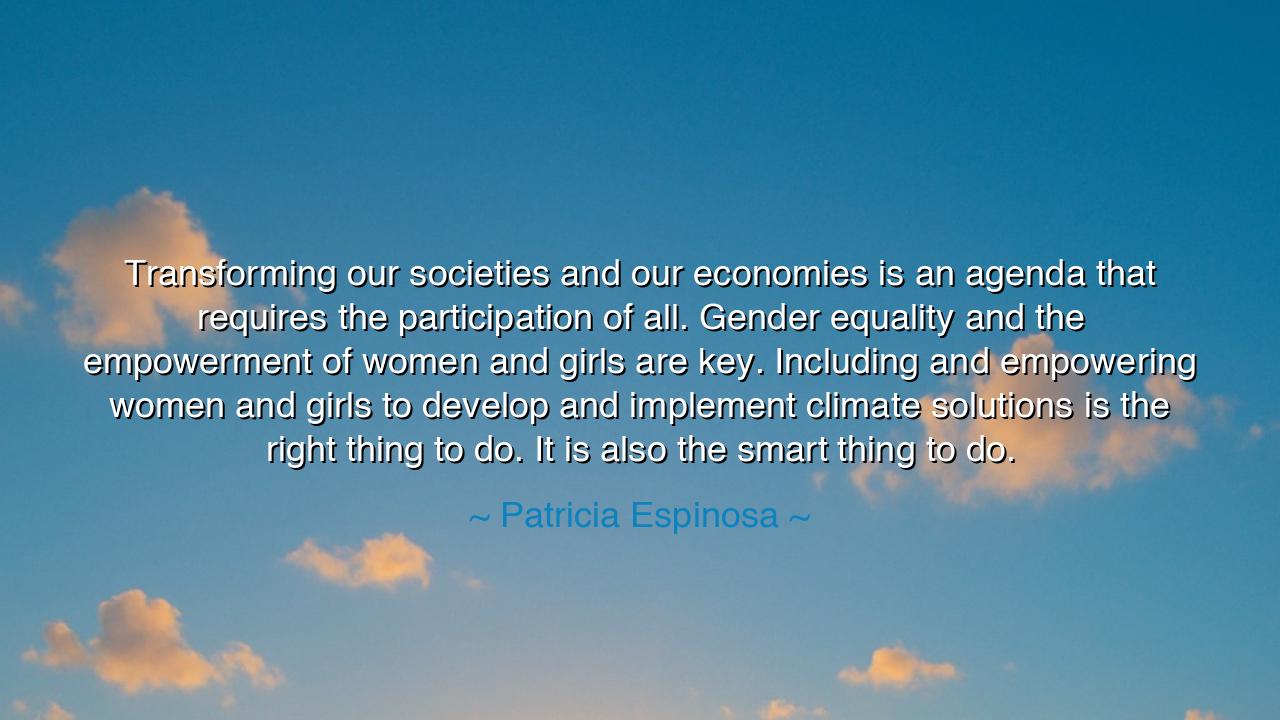
Transforming our societies and our economies is an agenda that
Transforming our societies and our economies is an agenda that requires the participation of all. Gender equality and the empowerment of women and girls are key. Including and empowering women and girls to develop and implement climate solutions is the right thing to do. It is also the smart thing to do.






"Transforming our societies and our economies is an agenda that requires the participation of all. Gender equality and the empowerment of women and girls are key. Including and empowering women and girls to develop and implement climate solutions is the right thing to do. It is also the smart thing to do." These words from Patricia Espinosa carry a profound and universal truth: the transformation of our societies and economies is a collective responsibility, one that cannot be achieved without the full participation of women and girls. The fight for gender equality and the empowerment of women is not a separate issue from the challenges of our time, including climate change. In fact, as Espinosa points out, empowering women and girls is not just the morally right thing to do—it is the wise and necessary path forward if we are to confront the greatest challenges facing humanity.
In the ancient world, the role of women in society was often marginalized, and their potential limited by the structures of power that favored men. Athens, often revered as the cradle of democracy, excluded women from political participation, relegating them to the private sphere. Yet, even in this deeply patriarchal society, there were voices that sought to challenge the status quo. Socrates, the great philosopher, taught that true wisdom lay in recognizing the inherent worth of all people, regardless of their gender. His teachings sparked a philosophical revolution, one that would lay the groundwork for future thinkers who would demand equality for all people. Patricia Espinosa’s call for gender equality in tackling the great issues of our time continues this ancient tradition—recognizing that the full participation of women is not merely desirable, but essential for the betterment of society.
Espinosa’s words are not only a call for justice but for practical action. She speaks to the urgent need to empower women and girls to play an active role in shaping the future, particularly in the area of climate solutions. The challenges posed by climate change are too great, and the stakes too high, to ignore the talent, creativity, and wisdom of half of the world’s population. The historical record is rich with examples of women who, despite being excluded from traditional power structures, have made remarkable contributions to the betterment of society. Rachel Carson, for instance, a scientist and author, wrote Silent Spring, a groundbreaking book that raised awareness about the dangers of pesticides and helped launch the modern environmental movement. Carson’s ability to use her voice and knowledge to advance environmental solutions serves as a powerful reminder that the fight for climate justice cannot afford to overlook the contributions of women.
The truth that gender equality is essential to climate solutions is reinforced by numerous studies showing that women, particularly those in vulnerable regions, are uniquely positioned to lead sustainable initiatives. In many parts of the world, women are the primary caretakers of natural resources, whether through farming, water management, or caring for the environment. Their intimate understanding of their local ecosystems makes them natural leaders in developing climate solutions that are both sustainable and culturally relevant. Moreover, studies have shown that when women are empowered to make decisions, whether in government, business, or local communities, the results are often more effective, inclusive, and equitable. This is not just a matter of fairness—it is a matter of pragmatism. Espinosa’s message emphasizes that including women in climate action is not just morally right, it is also the smart choice if we are to succeed in addressing the environmental crisis.
In the history of social change, the involvement of women has been a force of transformation. The suffragists, such as Susan B. Anthony and Elizabeth Cady Stanton, fought for women’s right to vote, not just as a political issue, but as a fundamental human right. Their struggle was not easy, and their victories were hard-won, but their efforts forever altered the political landscape. Similarly, in the context of climate change, the empowerment of women is a critical step in creating the kind of society and economy that can meet the challenges of the future. Greta Thunberg, a young woman from Sweden, has become a symbol of youth-led environmental activism, showing that young women can indeed lead the way in advocating for bold climate action.
The lesson to be learned from Espinosa’s words is clear: gender equality and climate justice are inseparable. The solutions to our most pressing global challenges will not come from a single group or from those who have traditionally held power. They will come from the collaborative efforts of all people, with women and girls playing a central role in shaping the future. Whether through education, policy, or innovation, empowering women is an investment in the future—a future where sustainability, justice, and equality are not just ideals, but living, breathing realities.
So, future generations, let these teachings guide your path. Embrace the call to empower women in every area of life—from leadership to climate action, from business to community building. Recognize that gender equality is not a side issue but central to the transformation of our societies and economies. Engage women and girls as partners in every endeavor, and listen to their voices as they lead us toward the solutions we need to build a just, sustainable, and equitable world. The world of tomorrow depends on the actions we take today—actions that must include everyone, for in the pursuit of justice, the participation of all people is required.






AAdministratorAdministrator
Welcome, honored guests. Please leave a comment, we will respond soon